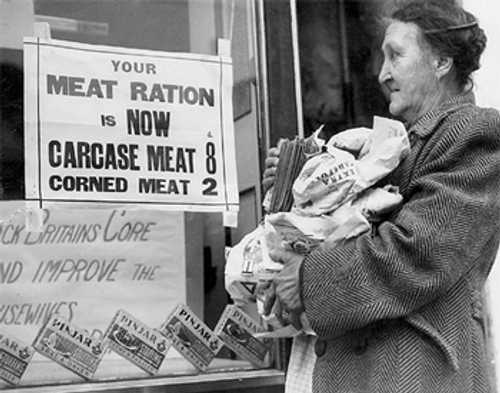
Homefront
Britain - rationing.
Unknown (UK) author.
An elderly lady contemplates her meat ration, London, ?1941. All European nations involved in the war introduced schemes of rationing, of greater or lesser severity. Since Britain imported well over half of its food requirements, a pretty severe scheme was introduced early in the war. In Germany, the contemporary scheme of rationing was quite benign until, in the aftermath of Stalingrad, the declaration of "total war" involved a much more stringent rationing programme. How did the Germans manage to continue "rationing-lite" for so long ? Well, by stripping its occupied countries of resources unmercifully. This could have compound effects. For example, the Wehrmacht stripped French agriculture of huge numbers of horses (required for ploughing, haulage etc.) while Germany still insisted on requisitioning (effectively) a substantial percentage of (reduced) French agricultural production (as much as 30 per cent) for German consumers. The French did not exactly end up eating grass - but they had great difficulty in achieving a reasonably full stomach. In Britain, there is a sense in which rationing was simpler. Lots of stuff was simply unavailable. Many products - wine, citrus fruit, other exotic fruits (e.g. bananas, pineapples) ... were simply unavailable, either because such products were "squeezed out" from the limited available shipping by materials of higher priority, or because sources of supply were simply cut off. The most bothersome elements of rationing in Britain (though not the only ones) were restrictions on access to meat and to petrol (gasoline). As to petrol, this was a premium requirement for the war effort, and quantities available to "civvies". were very limited. This generated a vigorous "black market" in gas. The Government attempted to counter this by adding colored dyes to petrol and diesel. However, unlike modern "marked fuels" (for tax purposes) these early markers were easy to remove; passing the stuff through the ventilator of a gas mask was pretty effective. Nonetheless, fuel remained very scarce. As regards meat - again, a considerable black market developed. While meat rationing was reasonably effective, it was impossible to prevent naughty farmers, butchers and general purpose criminals from evading rationing restrictions by establishing private slaughtering, marketing and distribution systems. A peculiarity about British rationing was that, in some respects, it actually became more severe immediately following the war's end. This was a consequence of the partial withdrawal of US support, the chaotic state of Continental European agriculture (all those dead horses, etc.) and the state of UK indebtness at the end of the war. For example - bananas were only rationed in Britain following the end of the war (they had probably been pretty scarce during the war, anyway) and were only "de-rationed" in the early 1950s. Best regards, JR.
2897 Views
9/17/2015
